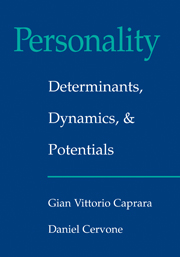Book contents
- Frontmatter
- Contents
- Preface
- PART ONE INTRODUCTION TO PERSONALITY PSYCHOLOGY
- PART TWO DESCRIPTION AND EXPLANATION
- PART THREE THE DEVELOPMENT OF PERSONALITY
- PART FOUR THE DYNAMICS OF PERSONALITY
- Introduction to Part IV
- 9 Knowledge Structures and Interpretive Processes
- 10 Affective Experience
- 11 Unconscious Processes and Conscious Experience
- 12 Motivation and Self-Regulation
- PART FIVE EPILOGUE
- References
- Author Index
- Subject Index
Introduction to Part IV
Published online by Cambridge University Press: 04 February 2011
- Frontmatter
- Contents
- Preface
- PART ONE INTRODUCTION TO PERSONALITY PSYCHOLOGY
- PART TWO DESCRIPTION AND EXPLANATION
- PART THREE THE DEVELOPMENT OF PERSONALITY
- PART FOUR THE DYNAMICS OF PERSONALITY
- Introduction to Part IV
- 9 Knowledge Structures and Interpretive Processes
- 10 Affective Experience
- 11 Unconscious Processes and Conscious Experience
- 12 Motivation and Self-Regulation
- PART FIVE EPILOGUE
- References
- Author Index
- Subject Index
Summary
Scholars have provided an endless stream of metaphors to describe human nature. Some prove to have little value, whereas others are useful heuristics. One valuable metaphor of 20th century science is the person as information processor (e.g., Newell & Simon, 1972). A person is “a dynamic information processor whose unique memories and perceptual structures lead to a unique cognitive, affective, and behavioral signature” (Revelle, 1995, p. 318). The information processing metaphor stimulated many of psychology's advances in the latter third of the century.
Despite its value, the information processing metaphor cannot be pushed too far. It possesses four limitations as a framework for the study of personality. First, it presents an incomplete portrait of the influence of social experience on mental structures. As Edelman (1992) emphasizes, information processing systems experience a change in software but not hardware as a function of experience. One's computer does not develop a more or less elaborate circuitry based on the programs one runs. In contrast, the hardware of the brain does change as a function of experience. The nervous system itself develops “through interactions with the world” (Edelman, 1992, p. 226; also see Kolb & Whishaw, 1998). A second limitation is that the original information processing model depicted a serial processor with a central executive, which handled bits of information one at a time. In contrast, it is widely recognized that brains process multiple streams of information simultaneously or in parallel.
Information
- Type
- Chapter
- Information
- Personality: Determinants, Dynamics, and Potentials , pp. 248 - 249Publisher: Cambridge University PressPrint publication year: 2000
